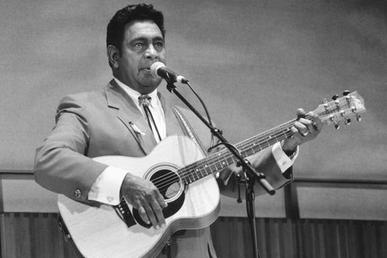Jimmy Little (1937-2012) was an Australian singer, songwriter, and actor known for his distinctive voice and his contribution to Aboriginal music. He was born in Cummeragunja, New South Wales, in 1937, and was of the Yorta Yorta people. He began his career in the 1950s and rose to fame in the 1960s with songs such as “Royal Telephone” and “Brown Skin Baby.” He also had a successful acting career, appearing in films such as the 1971 classic “Walkabout.” His influence on Aboriginal music and culture continued throughout his life, and he was made a Member of the Order of Australia in 1992. In 2004, he was awarded the Australian Recording Industry Association Lifetime Achievement Award. He passed away in 2012, leaving behind a legacy of music and culture.
Early Life
and Career
Jimmy Little was an Australian singer, songwriter, guitarist, and actor best known for his music career and his work as an Aboriginal rights activist. Born on the 1st of March, 1937 in Cummeragunja, New South Wales, Little started singing as a young child and was exposed to country music and gospel music from his father, who was a pastor. He started performing at local events and small clubs, and by the early 1960s had become a successful artist. In 1965, Little released his debut album Royal Johnny, which was well-received and topped the Australian charts. He went on to release several more albums throughout his career, including Jimmy Little Sings Country (1971) and Messenger (1985).
Little was also a passionate advocate for Aboriginal rights, and was appointed a Member of the Order of Australia in 1992 in recognition of his work. He was also appointed a National Treasure by the National Trust of Australia in 2006. He passed away in 2012, but his commitment to Aboriginal rights and his legacy as a singer and songwriter live on.
Career Highlights
Jimmy Little was an Australian singer, songwriter, and actor whose career spanned over six decades. His long career was full of accomplishments, including his induction into the ARIA Hall of Fame and his contribution to the Aboriginal music industry in Australia.
Little had several hits in the 1960s which included “Royal Telephone”, “Brown Skin Baby”, and “My Brown Skin Baby”. He was also the first Indigenous Australian to have a single to reach number one on the Australian Singles Charts. His music was incredibly influential and he was known for his smooth, soulful voice.
Little had a long career in the music industry and made many appearances in television shows and films. He acted in the ABC series ‘The Circuit’ and performed in the Sydney Opera House. He was also the host of the popular ABC music show ‘Message Stick’. Little was an advocate for Aboriginal rights and was a strong supporter of the 1967 referendum, which granted Indigenous Australians the right to vote.
Little was also a successful actor who appeared in films such as ‘Rabbit-Proof Fence’, ‘The Proposition’ and ‘The Tracker’. He was awarded an Order of Australia Medal in 1992 for his services to music and Aboriginal people. Little passed away in 2012 and is remembered as one of the most influential Indigenous Australian musicians of all time.
Music Influence
Jimmy Little was a legendary Australian musician who has influenced music in the country and around the world. He was a songwriter, singer, and guitarist and his music was a mix of traditional Aboriginal music with gospel and country music. Little was the first Indigenous Australian to have a number one hit on the national charts in the 1960s and was an important part of the cultural landscape in Australia at the time. He was also an advocate for Indigenous rights and often used his music to support Aboriginal causes. His influence on music has been felt in Australia and around the world, with his songs being covered by a range of artists from all genres. Little was an accomplished musician and his influence on the music scene in Australia continues today. He was awarded the Order of Australia Medal in 2004 for his contribution to music and Indigenous affairs. His music has inspired generations of Australian musicians and his legacy lives on in the music he created.

Awards and Accolades
Jimmy Little is known for his music and his legacy of advocacy on behalf of Indigenous Australians. But what many people may not know is that he was the recipient of numerous awards and accolades for his achievements. In 2003, Little was awarded the Order of Australia, the highest civilian honor in the country. He was also given the National Indigenous Music Award in 2005. Little was also a recipient of the Australian Music Association’s Music Industry Achievement Award in 2006. In addition, Little was given the National Aboriginal and Torres Strait Islander Music Award in 2007, and was inducted into the ARIA Hall of Fame in 2008. His legacy lives on through the Jimmy Little Foundation, which works to improve the health and wellbeing of Indigenous Australians. Little’s impact on the music industry and his advocacy for Indigenous Australians is undeniable, and his awards and accolades are a testament to his legacy.
Personal Life
Jimmy Little was born on August 1, 1937 in Cummeragunja Aboriginal Station, New South Wales. He grew up learning traditional music and songs from his family, and he started performing at an early age. In his teens, Little moved to Sydney and started to pursue his dream of becoming a professional musician. He joined the Royal Australian Navy in 1955 and served in the Korean War. Little released his first single, “Royal Telephone”, in 1957. He became the first Aboriginal singer to be signed to a major label. After leaving the Navy, Little became one of the first Aboriginal people to be featured regularly on national television. He released a number of successful albums and singles throughout his career and was an advocate for Indigenous rights. He passed away in 2012 after a long battle with kidney disease.
Jimmy Little was a pioneering figure in the Australian music industry and beyond. His legacy lives on in the hearts of his fans, and his music continues to inspire new generations of artists. Little’s success was a major milestone for Aboriginal artists and a reminder of the importance of equality and representation in the media. His life was an example of how determination and hard work can help overcome any obstacle.
Legacy
of Jimmy Little
Jimmy Little was an iconic Australian musician and actor whose career spanned over sixty years. He was a prolific recording artist, releasing over twenty-five albums, and was the first Indigenous Australian to receive a gold record. His music style was rooted in country, folk, and gospel, and he was an important voice in bringing the music of Indigenous Australians to the mainstream.
Apart from his music, Little was an important advocate for Indigenous Australians, campaigning for improved health care for Indigenous people, and speaking out against racism and inequality. He was the recipient of numerous awards and honours, including the Order of Australia, and was the first Indigenous Australian to be inducted into the ARIA Hall of Fame.
Little’s legacy lives on in the many musicians and actors he inspired, and in the work of the Jimmy Little Foundation, which he established in 2005 to improve the lives of Indigenous Australians. His contribution to Australia’s cultural landscape was immense, and his influence will continue to be felt for generations to come.
FAQs About the Jimmy Little Biography
Q1: Who is Jimmy Little?
A1: Jimmy Little was an Aboriginal Australian singer, songwriter, actor and a social advocate for the rights of Indigenous Australians.
Q2: When was Jimmy Little born?
A2: Jimmy Little was born on 1 March 1937 in Walgett, New South Wales, Australia.
Q3: How did Jimmy Little influence Australian music?
A3: Jimmy Little was an influential force in the history of Australian music, introducing Indigenous music to mainstream audiences and helping to pave the way for a new generation of Indigenous Australian musicians. He was also an advocate for social justice, helping to bring attention to the plight of Indigenous Australians.
Conclusion
Jimmy Little was a pioneer in Australian music. He was the first Aboriginal artist to achieve mainstream success, and he was an influential figure in the fight for Indigenous rights. His music was a powerful tool for raising awareness of Indigenous issues and his legacy continues to inspire Indigenous artists today. Jimmy Little’s voice was a beacon of hope, and his music will continue to bring joy to generations to come.



